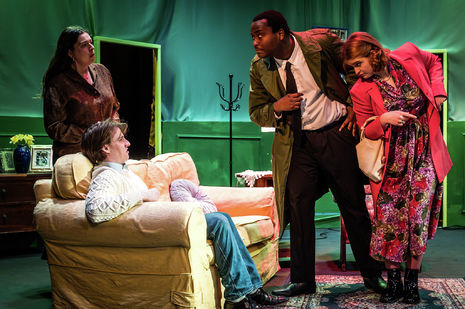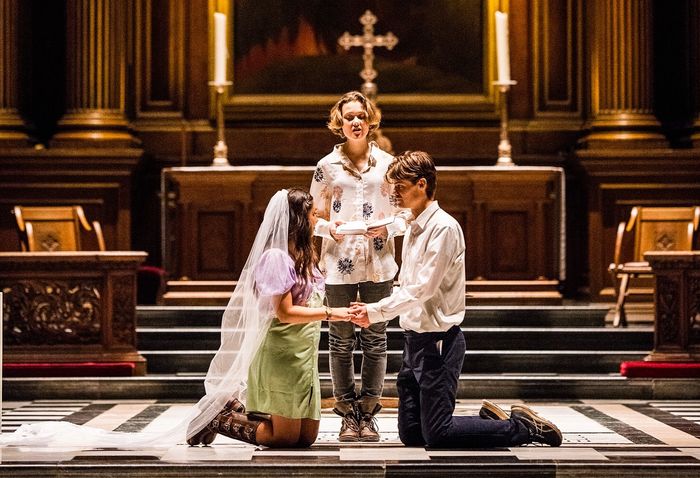In Neighbourhood Watch, paranoid, hypersexed nimbys run riot
With humour by turn slapstick and subtle, this dark comedy overcomes a clumsy allegory to delight its audience

Pairing drama with social criticism is a tough balancing act. Of course, we go to the theatre not only to have fun, but because it will make us think. However, it is all too easy for political messaging - however topical - to feel forced under the bright lights of the ADC. On stage, deliveries can inspire more cringe and less reflection.
Such is the risk run by the Heywood Society’s Neighbourhood Watch, directed by Pauline Eller. Set in the apparently closed-minded, middle-class, tea-drinking estate of Bluebell Hill, the play follows the neighbourhood’s decline and fall following the move-in of the Massie siblings Martin and Hilda. Their fears over safety lead to an increasingly tyrannical, self-imposed surveillance regime over the local residents. Tensions, from the mundanely domestic to the secretly subversive, bubble to the surface as the town descends into suffocating paranoia.
Fraught with frustrating political allegories, playwright Alan Ayckbourn fills his script with sub-committees, identity cards and body searches, lampooning the misguided sacrifice of freedom for security to the point of exhaustion. Desperate appeals against the corrupting dangers of ‘society’ receive awkward silences from the audience, while an extended speech decrying the ‘breakdown of trust’ between the state and its people feels contrived. With a first act well over an hour long, such issues are acutely amplified by the sheer length of this production.
The messaging of the play is thankfully counterbalanced by its comic brilliance. And oh boy, is this the show’s crowning strength. Set against a picture of Bible-reading domesticity, we are presented with the farcical imagination of its puritanical inhabitants. The residents of Bluebell Hill inhabit a hysterically riotous mental landscape. For them, beyond their garden’s eight-foot tall fence paedophiles prowl the streets, wankers hide in sheds, and whores lie in the gutters laying in wait for their next victim. Only Jesus (Martin’s garden gnome) stands between them and the abyss. From this deranged paranoia, we are gifted with some truly memorable scenes: a hilariously uncomfortable tea party, an unevenly matched punch-up between a wife-beater and a pacifist, and a chase through the audience to steal an oboe from a child. More interestingly, as the play goes on, the humour transcends the thigh-slapping to take on a distinctly probing edge. In exploring the illicit sexual liaisons of Martin and Hilda themselves, we uncover the hypocrisy behind the high-minded pretensions of nimby-dom.
"The messaging of the play is thankfully counterbalanced by its comic brilliance. And oh boy, is this the show’s crowning strength."
The acting, as so often in the ADC, was the highlight of the production. A creative melange of voices are thrown together, jostling ever more chaotically against one another to complement the heightened claustrophobia of the second act. Particularly worthy of praise are the performances of the leads. Sam Thompson charmingly plays Martin like a latter-day Frank Spencer, whilst Betty Blythe offers an ironic performance of Hilda Massie, Middle England personified, that is pitch perfect. The supporting roles of other residents of Bluebell Hill, from Michael Iorchir’s exuberantly slapstick Rod to Irisa Kwok’s swaggeringly sharp-tongued Amy, deflate tensions and provide alternate comic styles that are all their own.
"Only Jesus (Martin’s garden gnome) stands between them and the abyss"
The performance was admittedly let down a little by some patchy production. Whilst the lighting and stage setting were both excellent, including an effective use of smoke during a later scene, the sound system often became shrill. Scene changes were mostly slick, but there were some occasional delays. Also rather strangely, for at least a minute during the middle of the interval the safety curtain was removed to reveal the cast, apparently mid-scene, before being hastily raised again. These issues can hopefully be chalked up to opening night teething problems. (After all, it is week seven of Lent term).
Neighbourhood Watch can, at times, feel like an uneasy struggle between societal critique and humour. By the end of the first act, you might feel unsure about whether the two can be reconciled. In the end, they are. A witty comedy of manners punctuated by droll ribaldry (with a surprisingly moving ending), be prepared for an entertaining evening that ridicules all kinds of affectation, bombast and cant. Focus less on the show’s social commentary, and instead revel in its comic variety. If you don’t take it too seriously, you will have a great time.
Neighbourhood Watch is showing at the ADC until Saturday 9th March 2024.
 News / SU reluctantly registers controversial women’s soc18 December 2025
News / SU reluctantly registers controversial women’s soc18 December 2025 Features / Should I stay or should I go? Cambridge students and alumni reflect on how their memories stay with them15 December 2025
Features / Should I stay or should I go? Cambridge students and alumni reflect on how their memories stay with them15 December 2025 News / Dons warn PM about Vet School closure16 December 2025
News / Dons warn PM about Vet School closure16 December 2025 News / Cambridge study finds students learn better with notes than AI13 December 2025
News / Cambridge study finds students learn better with notes than AI13 December 2025 News / Uni registers controversial new women’s society28 November 2025
News / Uni registers controversial new women’s society28 November 2025










